As part of Outreach’s developing programme of work around archives and emotions this summer we hosted a weekend, July 13 and 14, that drew on arts-based approaches led by the artist and integrative arts counsellor, Michelle Rodrigues.
Working with a small team at The National Archives, she introduced a group to records from the collection exploring the lives of those in the Caribbean over the past 250 years while at the same time inviting the group to share something from their personal archives. They then used creative processes to reflect on their lives as living stories interwoven with past histories and future ones.
After the session, The National Archives’ Iqbal Singh and Dr Chloe Lee caught up with Michelle to find out how it went.
Iqbal Singh (IS) – Can you start by saying something about yourself and your approach?
Michelle Rodrigues (MR) – I studied fine art in 1992. Art became a place for me to express myself in ways that felt safe. To seek answers to questions that couldn’t be answered.
Although I wasn’t able to fully articulate it at the time, I was using art processes to explore concepts of colonisation and empire and aspects of my own identity. At the time there wasn’t an arena for thinking through those things, however, later I started tying it together with my own search for what I call ‘the hole in my soul’.
And this has informed my approach to the workshops, it came from my own art background, ancestry, and this real interest both with materials, process, and metaphor, but also just something about exploring the unknown through tactile experience, through sensory play and discovery.
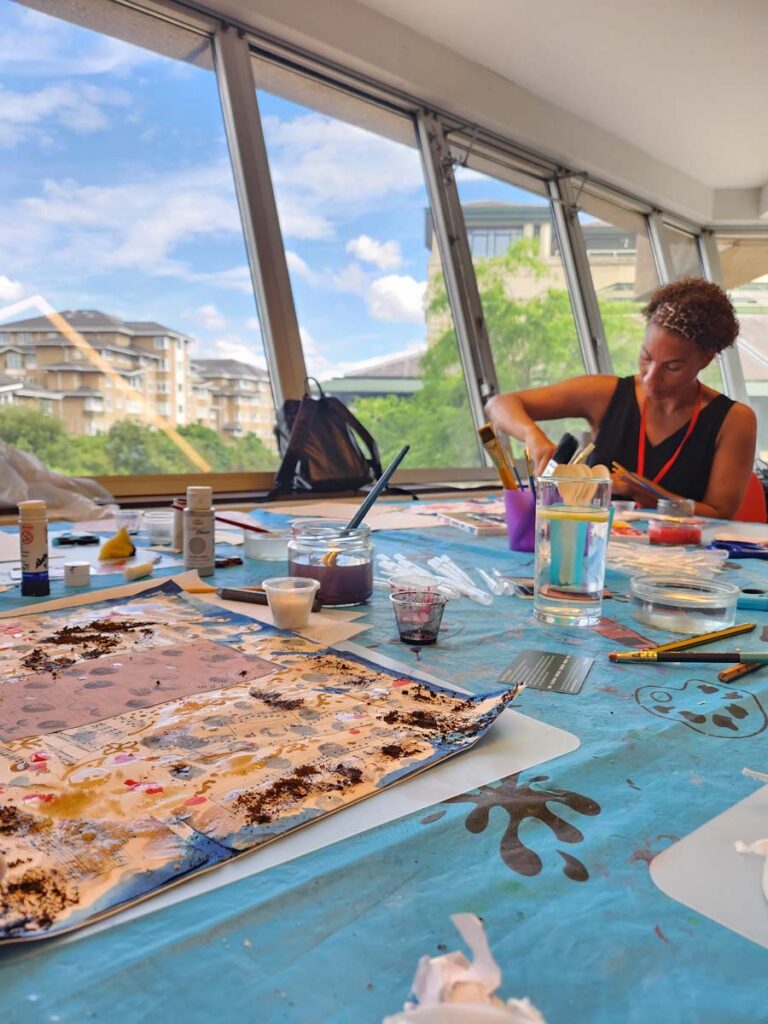
Chloe Lee (CL) – It’s making me think of your e-mail sign off, which is ‘art is not a hiding place, it’s a finding place.’
MR – Yeah, I’d say so, and this idea of archive, I think particularly came alive after my dad’s death in 2016. Although it wasn’t his place of origin, it was my father who was the connector for me to my mother’s Caribbean side of the family. After his death I felt like I was lost. It was like someone that helped me anchor my identity, had just disappeared. I felt lost and unmoored, as if my sense of identity and belonging had suddenly been ripped away. I had grown up most of my life far away from the wider family. Without the mirroring or cultural contextualisation, I had no real sense of heritage or how to identify, I saw most of my mother’s family as black, but I didn’t realise I was also Indian. I just didn’t know that. When it comes to the pain that is residual from the legacy of colonisation there’s all this silencing and my curiosity was often met with, ‘Don’t look there…’ as if I was doing something wrong.
IS – Those reflections are very powerful. How has it informed your art practice and the way it structured the weekend here at The National Archives?
MR – I’ve come to appreciate the power of the group and the importance of the collective experience of sharing deeply personal stories. In the workshop I wanted to hold space for the group to reflect and consider the nature and value of our own personal archive within the context of the historic or government archive. I also think that the art making process is about exploring the unknown through tactile experience and sensory play and discovery.
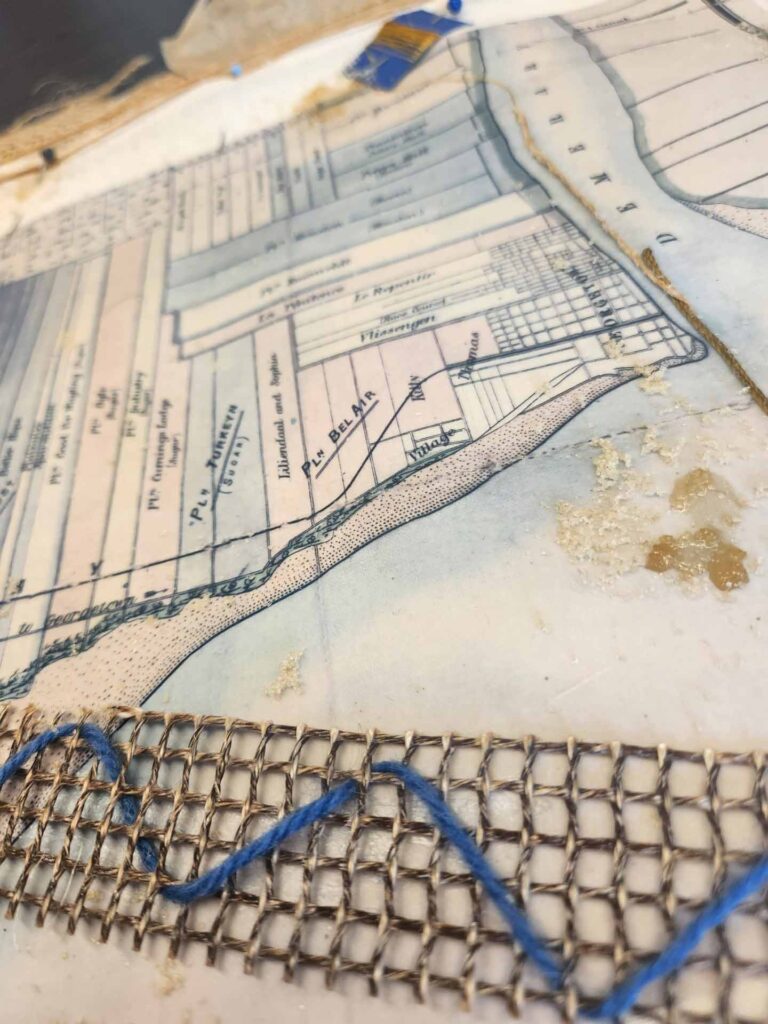
CL – People brought their personal archives into the session with objects, like photographs and keepsakes. I think weaving those together, the personal and the public record, demystified the search for ‘the document’ that will explain everything about ourselves and our pasts.
MR – There’s this idea of a sanitised catalogue and we want this to be a very concrete, clean, precise, and safe answer to those horrible feelings of uncertainty and ambiguity, and it’s just messier than that.
There’s this meeting of these two places, one being the archive, and one being this kind of very murky and ambiguous place that often we want to shy away from.
This is where metaphor comes in. What can happen in art practice is that sometimes when we are using different processes like mark making or using inks for example, it can produce outcomes that are not straightforward. Metaphor offers spaciousness.
IS – I think that that’s really helpful. The outcomes are not a clean answer. We’re dealing with the complexity of people’s histories.
And this picks up on other questions, like how do you measure these types of projects? What does ‘success’ look like?
MR – That’s a great question, because we are trying to quantify and measure things that cannot be measured. I think the whole nature of therapy often isn’t very measurable. And I feel often in art too, you know, there’s no concrete place you arrive at.
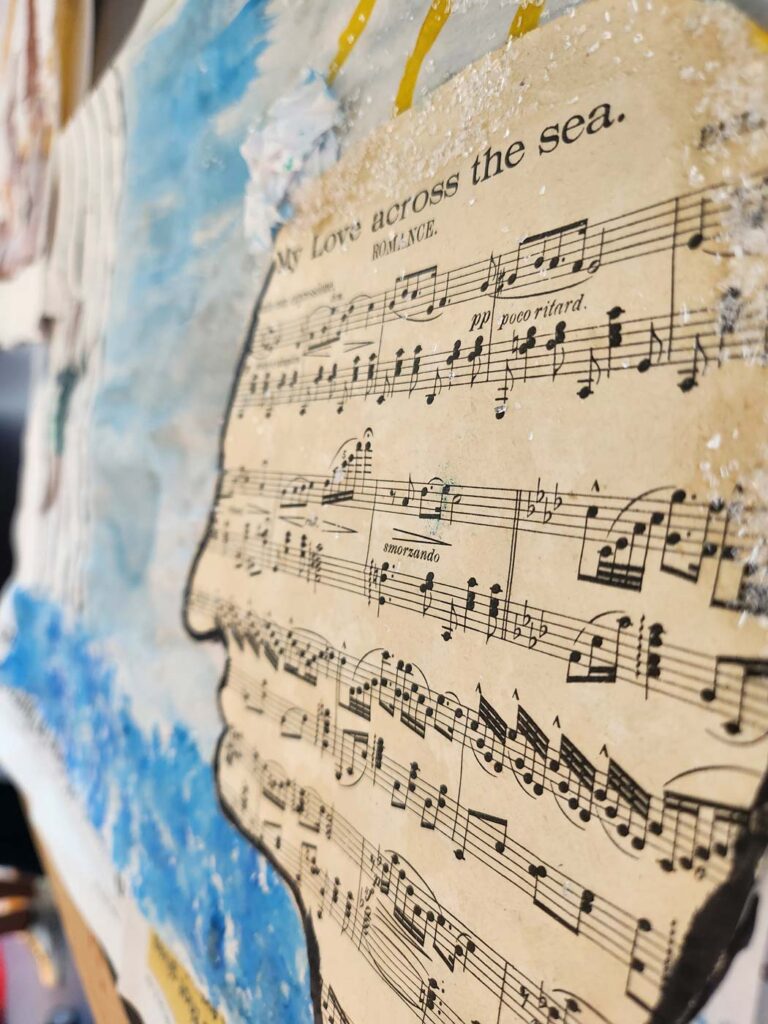
IS – So how do you know, for example, that this weekend was a success?
MR – I personally would measure the success by the engagement of the people and the connections that were forged through sharing and the recognition of common ground and experience. It seemed that there was a new emergence of paths, where before it just felt like there was one path. Broadened perspectives and deeper connections for me equates to success.
IS – There was some feedback about how things had been opened up by taking part in the workshop. One of the comments was this realisation that other people are dealing with something that they felt very alone in. And some of this stuff isn’t general everyday conversation. It was very opening and connecting, which links well with the title you selected for the weekend workshop, ‘The Golden Thread’. Can you say a little more about this briefly?
…There were others out there with whom I share thoughts and feelings on questions of heritage, belonging and identity…
Workshop feedback
MR – There’s this common thread, a bit like the golden thread, that’s shared, and that the individual isn’t having this strange experience alone.
IS – I think it was articulated very powerfully in one of your pieces for the Kuli Dhal Puri project. And you’ve talked about that connection with the ancestor, with the intangible, and the loss that you’ve experienced.
In the video you produced for the workshop, there was something very moving where you’ve chosen the Thames as the setting.
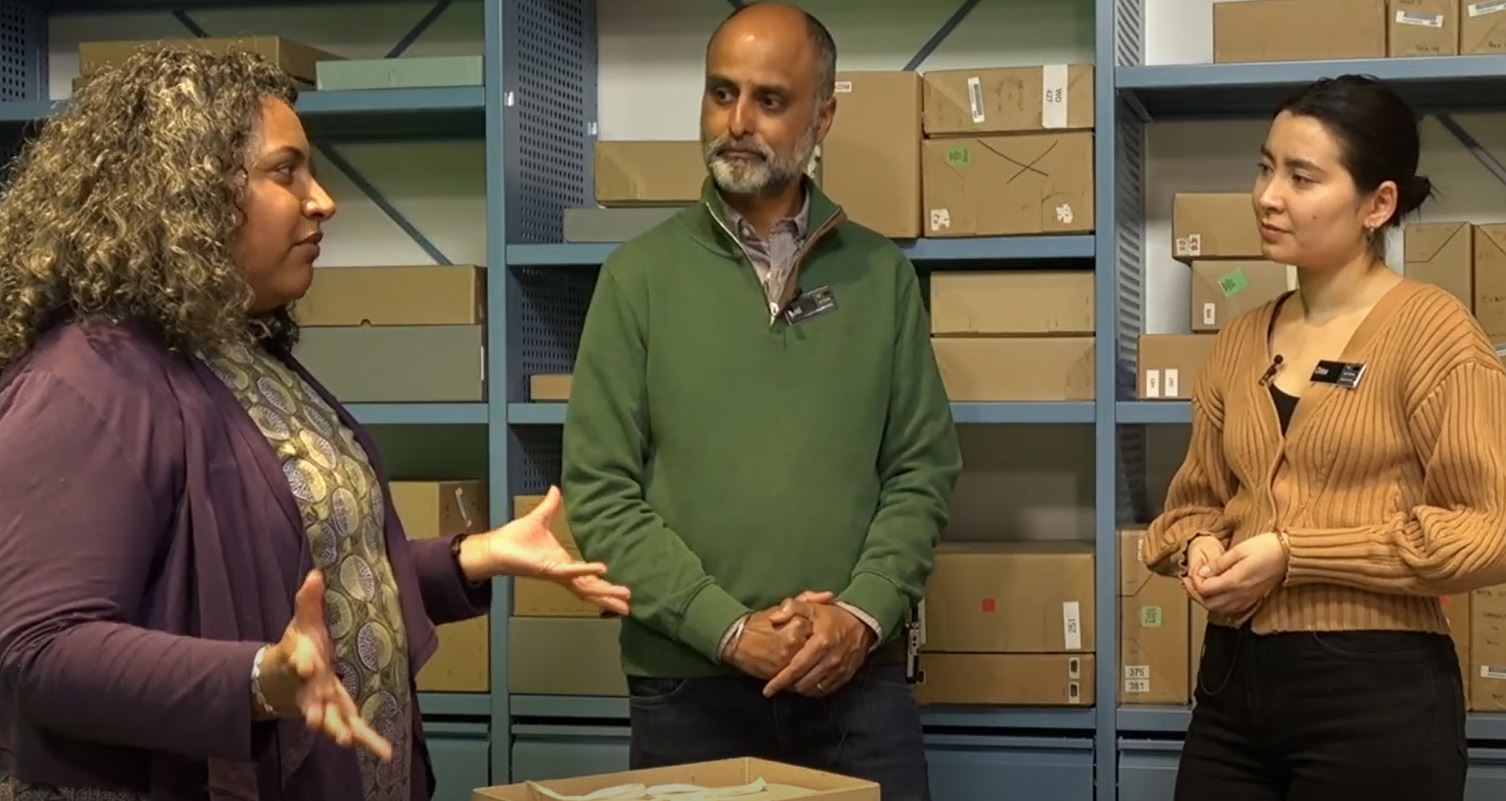
Watch a trailer for the Golden Thread Workshop session on YouTube, filmed by Rosie Morris
MR – I think this is because of my own history, I never stayed in one place. I was always moving. I wanted to film by the river, in Hammersmith, because that’s where I was born. I would often look at a map and It would be hundreds of miles away from the place where I was born. I wanted to find a way to centre myself again, you know, to be back with the family that I couldn’t be with. And this part of my own biography has echoes of the story of indenture. You know, it’s not lost on me that there’s echoes of that in there.
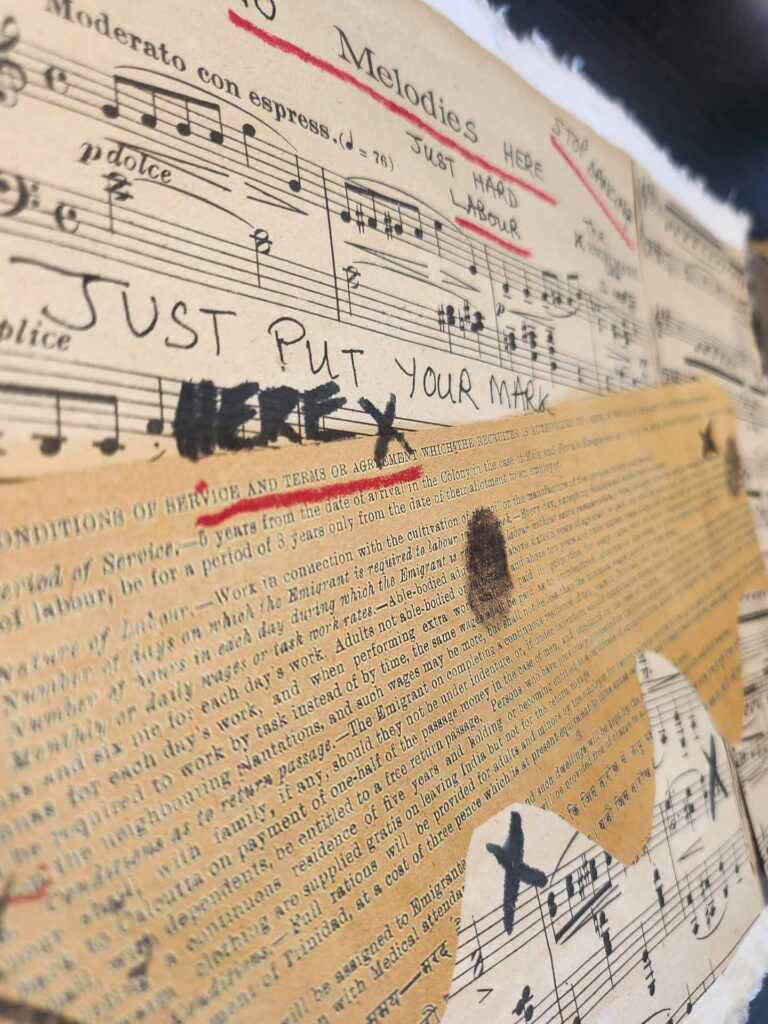
CL – There’s something quite moving in orientating ourselves towards home, and rediscovering what home is. There might not be this ‘archival anchor’ in the collections, you may have to look inward, and it’s an important part of having mixed or unknown heritages, but also diaspora. Where there’s been loss, where there’s been grief, maybe where there’s been family fracture and separation.
MR – This is where the group comes in and this connection and this shared experience. Home becomes this place that’s not a place. It’s an experience of connecting with others. The success is that moment where people are feeling this deep connection.
IS – You know, I can get a glimpse of God, of the Beloved, or whatever you might want to think that is at those moments of deep connection. There are these glimpses, these moments of revelation during the art practice, and you’re doing something exciting or powerful, that’s the goosebump moment.
MR – And I love the two photographs of the group taken at the end of the session. The first one is not staged, there’s this sense of connection between them all, there’s something very real about it. There’s a juxtaposition, between what’s fixed and what’s fluid. It’s really beautiful.
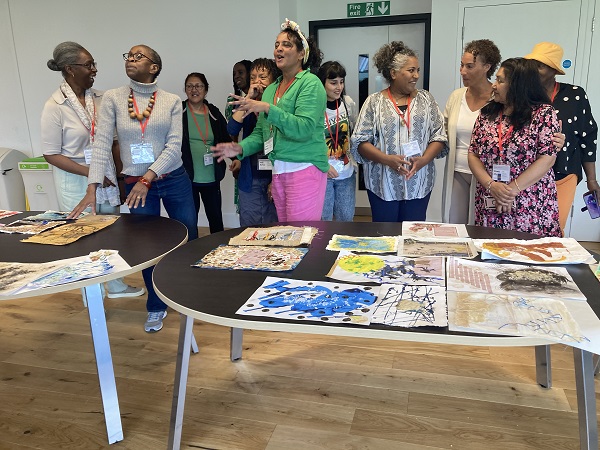
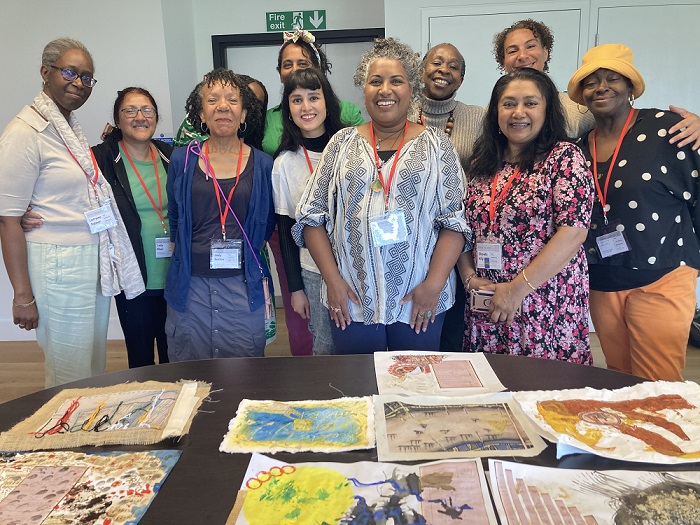
The Outreach team would like to extend a thank you to all the participants who took part in the Golden Thread weekend event. Thanks also to Rosie Morris, Education Manager, who supported the development of the Weekend and provided valuable technical assistance. Lastly, thanks to the Black African Asian Therapy Network (BAATN) volunteers (Robert Sookhan, Vedia Maharaj, Gisella Periera) for helping with emotional holding and practical efforts to make the weekend such a success.
We would like to do similar events in future in-person and online. Please sign up to our newsletter where you can hear about events at The National Archives.
Michelle, The Golden Thread workshop sounds very healing, powerful, enriching and beautiful . I was also touched by the quote ‘art is not a hiding place, it’s a finding place.’ I hope I can join the next one.
In those deep moments of connection, through art and with others , I too feel a soul stirring connection to The Beloved….
It is wonderful the work that the National Archives team are encouraging here.
Thank you. Namaste